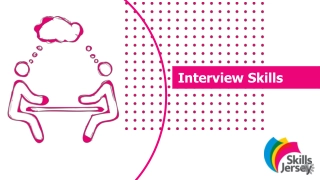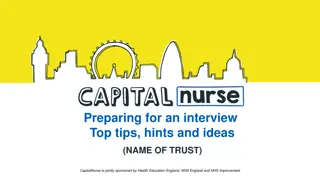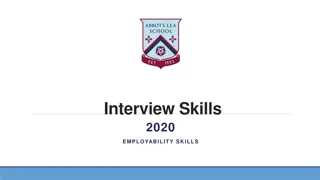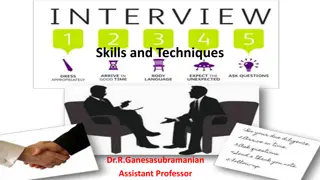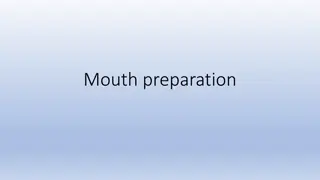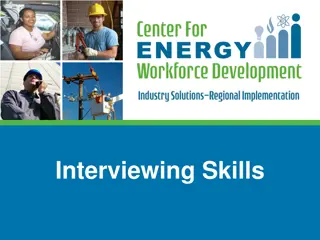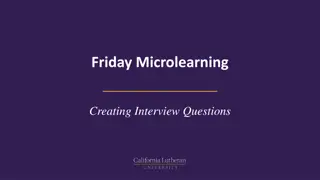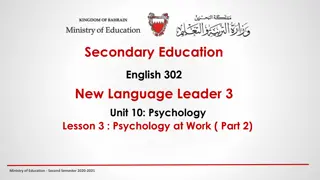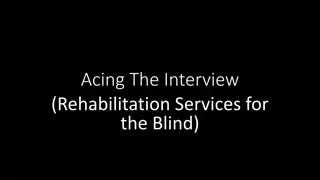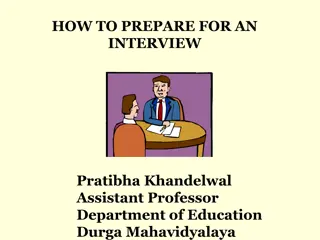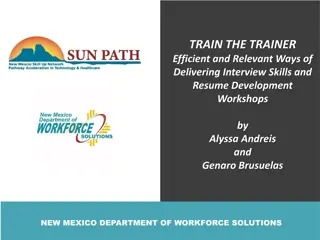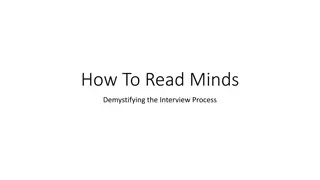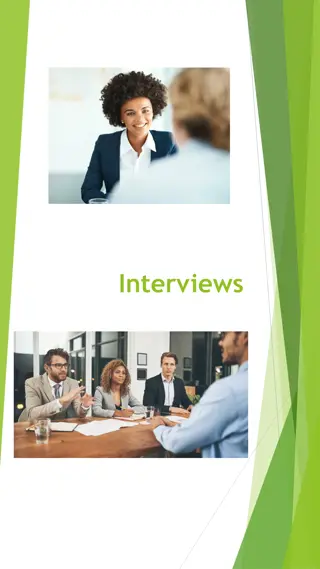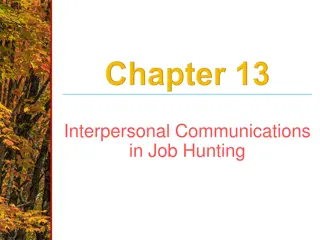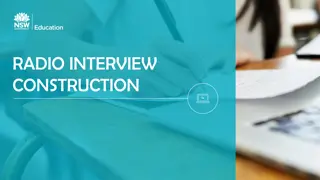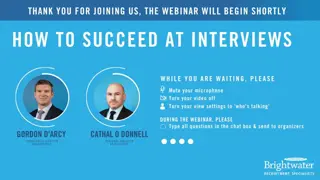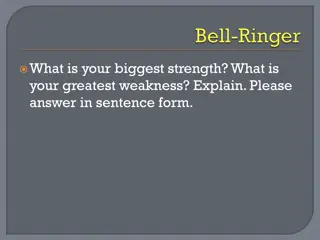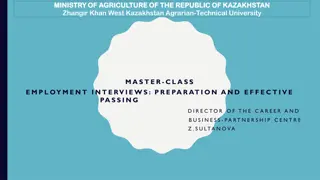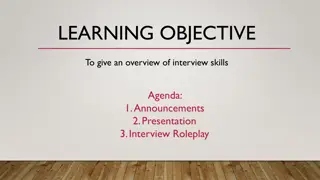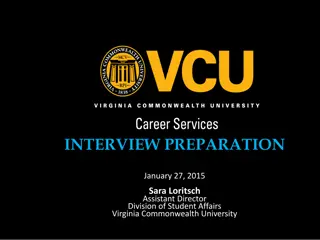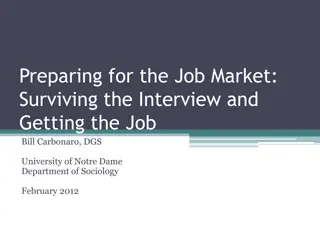Mastering Interview Preparation for Career Success
Understand the key aspects of preparing for job interviews including self-marketing, types of interviews, possible questions, and competency-based questions. Learn to target your approach, conduct research, and practice effectively to increase your chances of success in landing your desired job role.
Download Presentation

Please find below an Image/Link to download the presentation.
The content on the website is provided AS IS for your information and personal use only. It may not be sold, licensed, or shared on other websites without obtaining consent from the author. Download presentation by click this link. If you encounter any issues during the download, it is possible that the publisher has removed the file from their server.
E N D
Presentation Transcript
University of Nottingham Maggie Wolff and Rob James Senior Careers Advisers Careers and Employability Service Academic Year: 2011/2012 Self Marketing: Interviews
The Interview It s a meeting between the recruiter and the job applicant. The recruiter s role is to discover if the candidate is: *able to do the job *better suited to the job than other candidates *likely to fit into the team It s your chance to see if it s right for you!
Target your approach In order to prepare for an effective interview, you must consider what the recruiter is looking for. What skills do they want and how can you show evidence of these? Ideally, going into the interview, you have a tightly focused agenda which concentrates on matching your skills and experience to the requirements of the job. Preparation is key.
Preparation Research The employer (using their website example) The sector (Prospects website, news, related organisations) What the job is likely to involve (Prospects website) Practise answering potential questions A recent study showed the average undergraduate spends only 2 hours on this it s not enough!
Types of interview Telephone interview The technical interview One-to-one Panel (three or more interviewers) Multi stage (several interviews) Assessment centre (see DVD) Careers website Prospects Many employers use a combination of these at different stages in the application process.
Possible interview questions. Why do you think you are suited to a career in . e.g. marketing? What do you know about our company? Why did you choose to do a degree in..? What are your strengths and weaknesses? What would you say are your major achievements? What are the current developments in this sector?
Competency Based Questions Structured to reflect the competencies sought by an employer for a particular role. Your competencies are assessed by the interviewer and checked against their selected criteria. You can prepare for these. Examples: communication skills, teamwork, time management etc
Competency based questions STAR technique Example for communication skills Situation During my first year at University I was involved in... Task During my voluntary work we were given the task to.. My role was to../other people... Action I demonstrated effective communication skills as I.. Result As a result of the effective communication, we
Competency based interview questions Tell me about a situation where you had to solve a problem or make a decision that required careful thought. What did you do?
Competency based interview questions Give me an example of where you had to influence the actions of others. How did you do this and what was the outcome?
Competency based interview questions - Task Teamwork is an important part of this role. Give an example of when you have worked effectively in a team.
Case study interview questions These can range from a straightforward brainteaser e.g. How many yellow cabs in New York? or the analysis of a hypothetical business problem. How you tackle the problem How you structure your response How you reach your solution is often more important than the solution itself You will be evaluated on: Your analysis of the problem Your particular line of thinking
Technical interview questions These generally occur in science, engineering and IT where the interviewer asks questions which should enable you to demonstrate your technical knowledge.
Before the interview checklist Double check the interview schedule, location and your travel arrangements Re-read your application Refer to our careers service website Positive attitude
First Impressions Count Dressing smartly shows that you are taking the interview seriously Greet the interviewer confidently, maintaining eye contact during the interview Be pleasant to all staff. If shown around the workplace demonstrate your interest to the person showing you around. REMEMBER you are being assessed all the time.
At the Interview It is natural to feel nervous, but show you can manage this. Try to be yourself. Be pleasant to the other candidates. Employers look for good team players. With questions, consider what they are trying to find out from your answer. Think back to those competencies!
Sell Yourself Don t understate your abilities and strengths Don t assume that your application has been read thoroughly Speak confidently and clearly about your experiences. DO highlight what you have stated in your application.
Careers support and resources DVDs which you can view at Careers and on the University network. See Careers web site Books (some can be borrowed overnight) Origins of interviews Discuss your preparation with your tutor or careers adviser
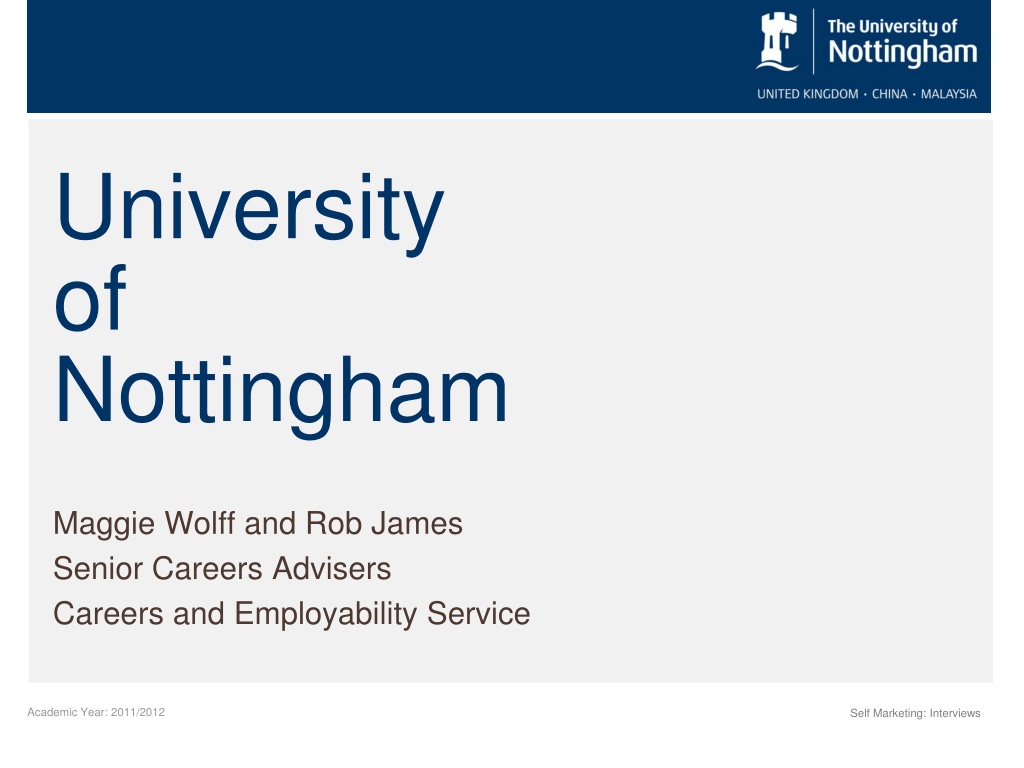
 undefined
undefined


